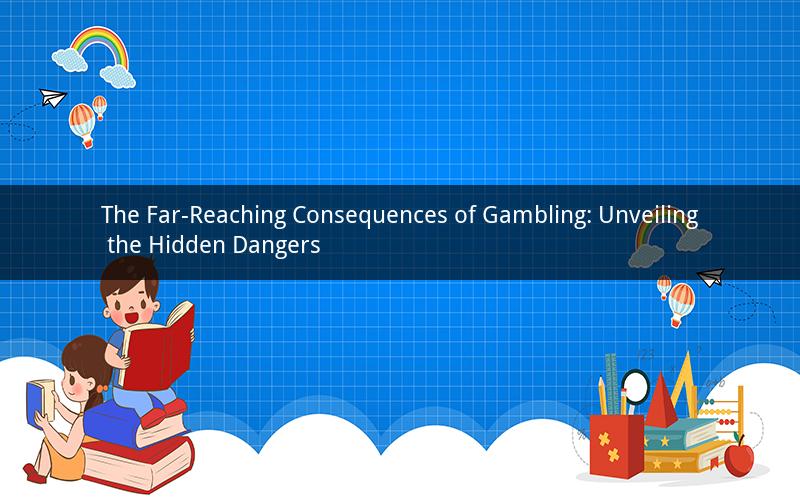
Gambling, an activity that has been around for centuries, continues to captivate individuals across the globe. While some may view it as a harmless form of entertainment, the truth is that gambling can lead to a myriad of negative consequences. This article delves into the various aspects of what gambling can cause, shedding light on the hidden dangers lurking behind the glitz and glamour of this enticing pastime.
1. Financial Ruin
One of the most immediate and severe consequences of gambling is financial ruin. Many individuals, driven by the thrill of winning big, end up spending far beyond their means. The allure of the potential windfall often leads to excessive betting, resulting in mounting debt. In extreme cases, individuals may even resort to stealing or fraud to fund their gambling habits, leading to legal repercussions.
1.1 How can excessive gambling lead to financial ruin?
Excessive gambling can lead to financial ruin through a combination of factors. Firstly, the odds of winning are typically stacked against the gambler. As a result, most individuals end up losing more money than they initially intended. Secondly, the psychological aspect of gambling, such as the feeling of euphoria when winning and the urge to chase losses, can lead to irrational behavior and further financial distress.
1.2 Can financial ruin be prevented?
Financial ruin caused by gambling can be prevented through responsible gambling practices. Setting a budget, sticking to it, and recognizing the signs of problem gambling are crucial steps in maintaining financial stability. Seeking help from professionals or support groups can also provide individuals with the necessary tools to overcome their gambling addiction.
2. Mental Health Issues
Gambling can have a profound impact on an individual's mental health. The stress and anxiety associated with the pursuit of winning can lead to various psychological disorders. Some of the common mental health issues caused by gambling include depression, anxiety, and substance abuse.
2.1 How does gambling contribute to mental health issues?
Gambling contributes to mental health issues by creating a sense of unpredictability and control. The constant chase for winning can lead to increased stress levels, anxiety, and a sense of helplessness. Moreover, the failure to win can exacerbate feelings of depression and low self-esteem.
2.2 Are there treatments available for gambling-related mental health issues?
Yes, there are treatments available for gambling-related mental health issues. Therapy, such as cognitive-behavioral therapy (CBT), can help individuals develop healthier gambling habits and address underlying psychological issues. Additionally, support groups like Gamblers Anonymous can provide individuals with a sense of community and a platform to share their experiences.
3. Family and Relationship Problems
Gambling addiction can have a detrimental impact on family and relationships. The financial strain, emotional turmoil, and time spent on gambling can lead to strained relationships, divorce, and even homelessness for the addicted individual and their loved ones.
3.1 How does gambling affect family and relationships?
Gambling affects family and relationships by causing financial strain, emotional distress, and a lack of trust. The addicted individual may become distant, secretive, and even abusive. This can lead to increased conflict and a breakdown in communication, ultimately damaging the fabric of the family unit.
3.2 Can gambling addiction be overcome in a relationship?
Overcoming gambling addiction in a relationship requires a combination of support, communication, and understanding. It is essential for the addicted individual to seek help and for their loved ones to provide a supportive environment. Couples therapy can also be beneficial in addressing the underlying issues and rebuilding trust.
4. Social Consequences
Gambling addiction can have far-reaching social consequences, including social isolation, a decline in social skills, and a loss of reputation. The addicted individual may become estranged from friends and family, leading to a sense of loneliness and isolation.
4.1 How does gambling affect social life?
Gambling affects social life by creating a barrier between the addicted individual and their peers. The individual may become secretive, avoid social gatherings, and lose touch with friends and family. This can lead to a decline in social skills and a sense of isolation.
4.2 Can gambling addiction be overcome through social support?
Yes, gambling addiction can be overcome through social support. Joining support groups, attending therapy sessions, and engaging in social activities can help individuals rebuild their social life and reconnect with others. It is crucial for the addicted individual to seek help and for their loved ones to offer support.
In conclusion, gambling may seem like a harmless form of entertainment, but its potential consequences are far-reaching. From financial ruin to mental health issues, family and relationship problems, and social consequences, the dangers of gambling should not be underestimated. By recognizing the signs of problem gambling and seeking help, individuals can take the necessary steps to overcome their addiction and lead a healthier, more fulfilling life.
Questions:
1. What are some common warning signs of problem gambling?
2. How can individuals protect themselves from the financial consequences of gambling?
3. What role does therapy play in treating gambling addiction?
4. Can gambling addiction affect a person's career? If so, how?
5. How can friends and family support someone struggling with gambling addiction?